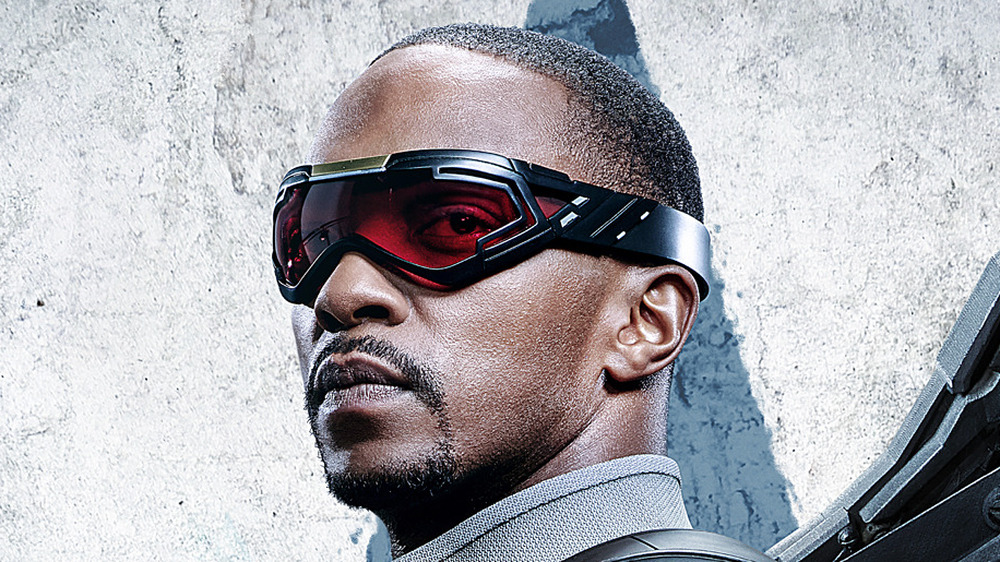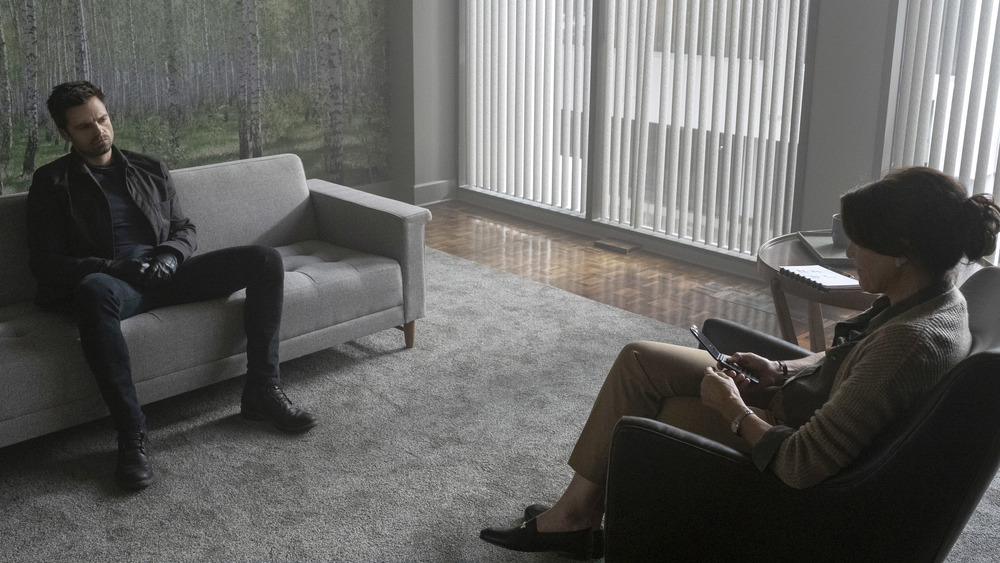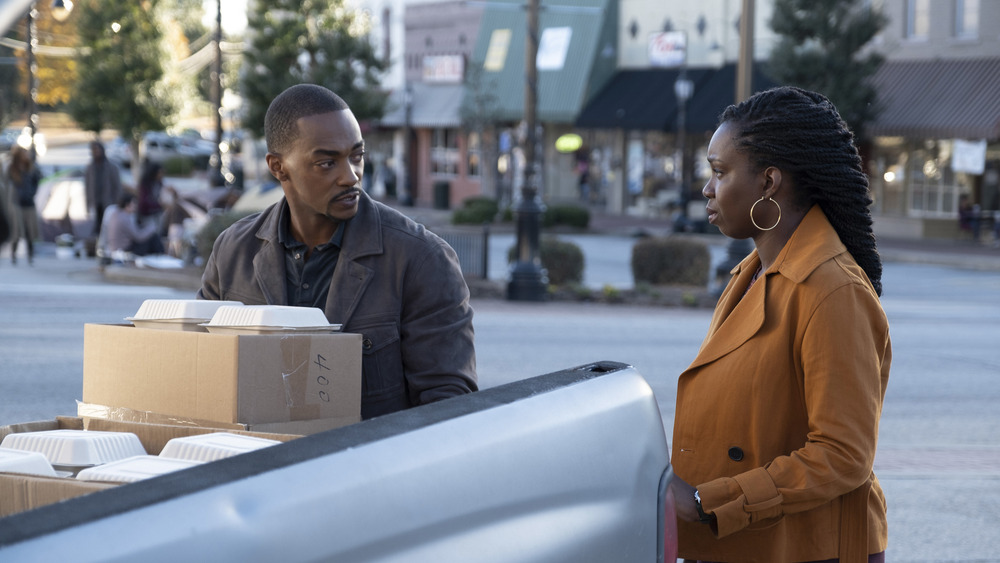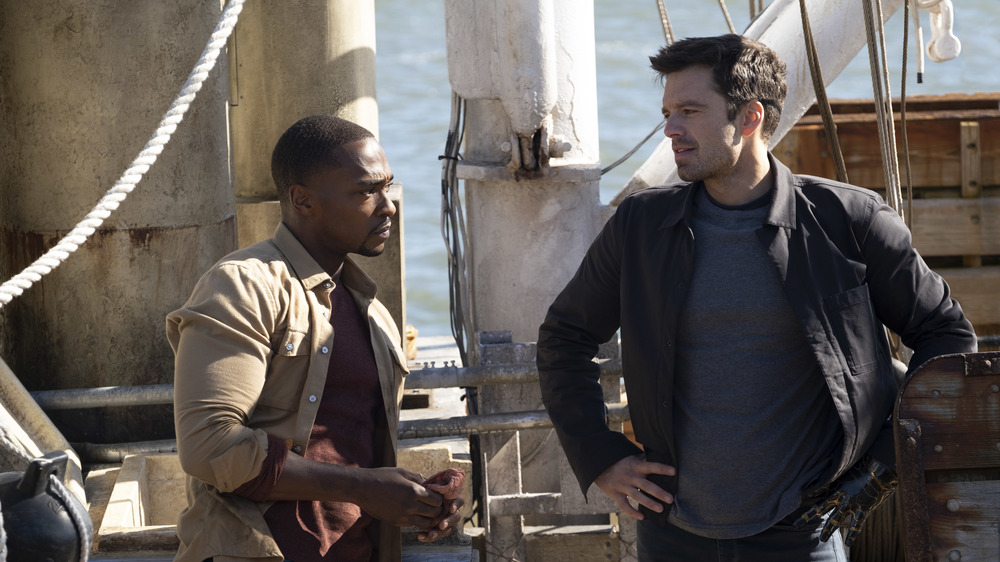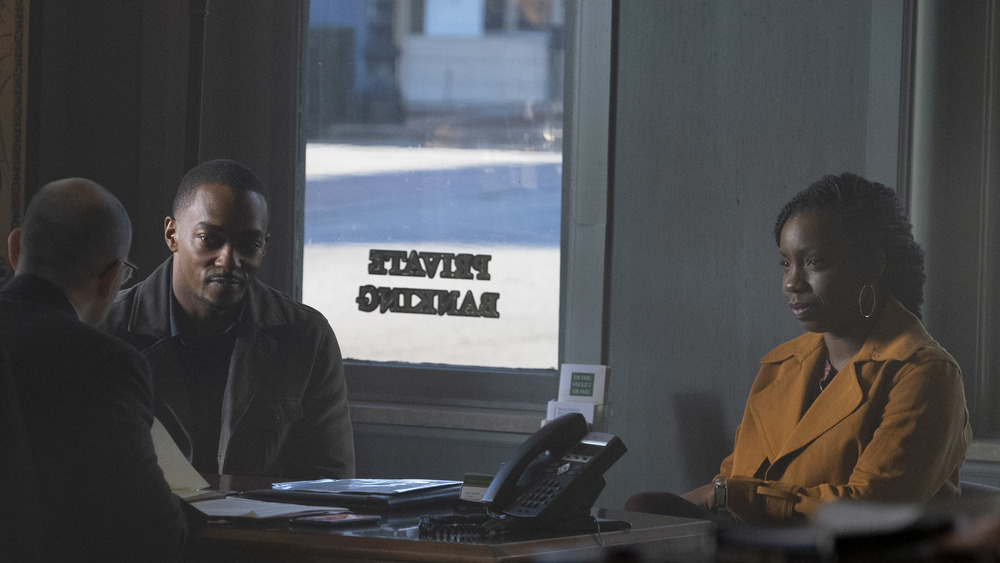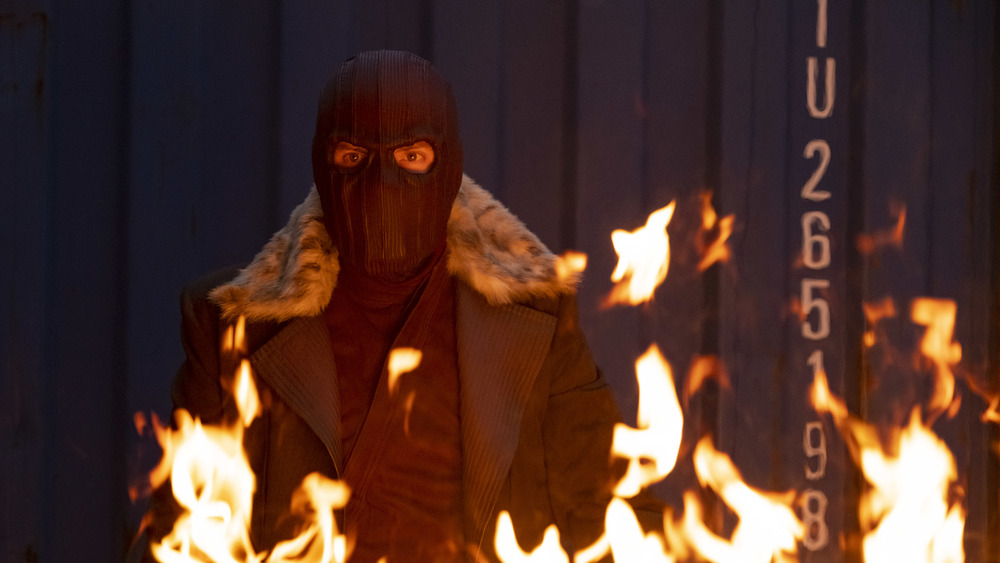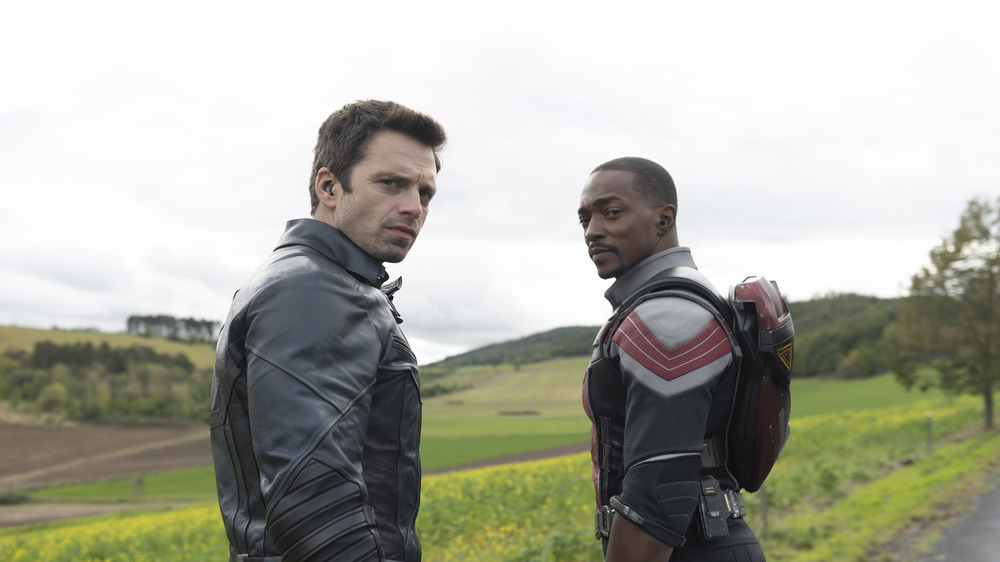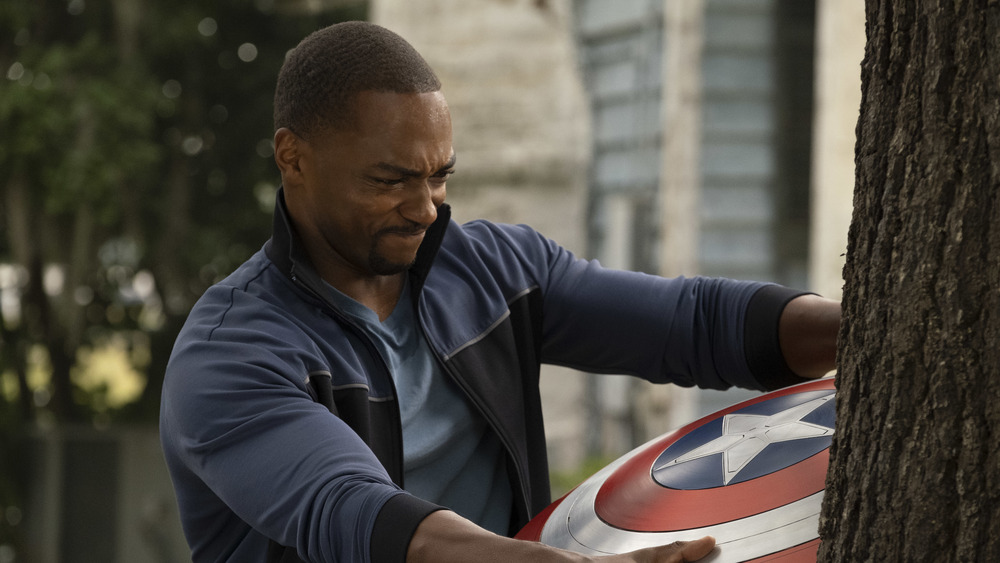Falcon And The Winter Soldier Showrunner Malcolm Spellman Talks The Social Impact Of The Series And More - Exclusive Interview
Much of The Falcon and the Winter Soldier's success attributes to one man: showrunner, executive producer, and head writer Malcolm Spellman. By creating a collaborative atmosphere in the writer's room and on set, he respected and listened to every actor about where their character arcs should go — both in the past and present. Spellman also made a point of addressing vital social issues like racism and PTSD, making the show a timely entry in the 2021 discourse.
So where have we seen Spellman's work before? The triple threat wrote seven Empire episodes and had various production roles on 30 episodes of the series between 2015 and 2017. He's also worked on the shows Truth Be Told, Hip Hop Uncovered, and the film His, Hers & the Truth. He also wrote all six episodes of The Falcon and the Winter Soldier in addition to his showrunner and executive producer duties.
Looper spoke to Spellman in an exclusive interview before the series debuted and he discussed the social impact of the series, how Anthony Mackie and Sebastian Stan helped shape their character arcs, and where we can expect the show to go from here.
Tackling Bucky's PTSD
It's heartbreaking that Bucky was sleeping on the floor with a blanket while he was plagued with nightmares over what Hydra made him do as the Winter Soldier. It's almost like he feels he doesn't deserve anything better. How did you go about navigating that PTSD, and what was most important for you to show when delving into that trauma?
It was one of the things we most wanted to explore and talk with Sebastian about. Marvel has done a great job of keeping it alive, and so it was an obvious thing to... Now the character finally has a breath, and I think he said it... I think I'm not going to repeat it because I'm not sure it's in the trailer. I'll say it because I'm 99 percent sure it's in the trailer. He basically says, "I've gone from one battle to the next and never had a chance to really deal with it." That's what we all showed up wanting to deal with, and Sebastian was ready to dive in.
Beyond the Blip
The Falcon and the Winter Soldier is the first time we're really seeing some of the ripple effects for the people we initially lost in the Blip. Sam can't even get a loan because he doesn't have any credit history over the past five years. Can you tease some other social issues like this that the show will tackle throughout the series?
I think one of the things we're most proud of is... the Blip [has] created a situation where everyone in the world has one thing in common — and everyone in the world, rich or poor, is struggling with one thing. Does that sound familiar? We really made it a point to mirror [the pandemic], not in a way that's heavy, but to just really make that world that we created for the MCU feel very much like this world. Because everybody right now has the same struggle.
Right. Based on the man who told Sam it was the right decision to come forward with Cap's shield, it seems like the series might tackle some racism regarding whether Sam should become Captain America — especially given that huge plot twist at the end of the first episode. What were the conversations on including those issues, and did Anthony Mackie lend any of his own insight?
Absolutely. I mean, certain things, as you saw from Black Panther, and sort of that hashtag that went around, "Killmonger was right." The Marvel fans don't want you to be dishonest. They don't want you to show up and make a movie or a project like this feel burdened or weighed down. But they don't want you to run from what's obviously there. So from the very beginning, me as a Black man, and Anthony Mackie, that was always going to be a part of his journey. I hope you will make sure fans know it's serious. The decision he makes is not an obvious one.
The Mackie and Sam connection
Sam Wilson is one of the few major MCU characters that we haven't seen a whole lot of backstory on until now. What were the most important plot points you wanted to hit on that front, and did Anthony Mackie provide any insight on where he wanted that arc to go?
Well, I think the answer to that is if you look into where Anthony Mackie comes from and where Sam comes from in real life, you know what I'm saying?
That's true. [Both Mackie and Sam Wilson are from Louisiana.]
Anthony was actually very protective of... These actors have to write who these characters are to show up to set every day, so Anthony's been Sam for ten years. We needed to stretch the rubber band of what Anthony had already built to be able to position him as a character so that he would feel relevant to today — so that he would have real conflicts — and we would go on this journey without snapping the rubber band from what Anthony built. So there was a very good exchange between all of us as creatives, and Anthony, about how to grow Sam — and launch him in this new journey without breaking who he thought Sam was.
A hero's fame without fortune
Right. One of the most hard-hitting scenes in the first episode is the bank scene. In a society that's so obsessed with celebrities, the teller trying to get ridiculous selfies with Sam, all while denying him the help he desperately needs for his family, is so relevant. How did that scene come about, and will we see more moments like this in the rest of the series?
Absolutely. It is, again, you just tell the truth about the world. And I think [that] scene [is] a great example of how you can invite all Marvel fans in without being dishonest to the struggles that the Black characters in MCU would obviously have to deal with. Trust me, it's only the beginning, it's only the beginning. Because, again, it's just this character has... Marvel, from the time they were only comics to now, has always allowed their stories to be relevant and deal with the times.
Zemo dark thirty
Definitely. How big of a role will the Flag-Smashers and Zemo play in the series?
[Jokingly] I don't know what you're talking about with the Flag-Smasher or Zemo.
You've seen the first episode. There are multiple villains in this. I don't even want to call them villains — they're antagonists. Because what I love about this series is everybody sees themselves as a hero in earnest, and even if they're doing terrible things. They all see themselves that way because of what's happened post-Blip. It's that thing we talked about where the world... the MCU at this moment feels very much like the world today — and look at how crazy people are responding to it. So everybody has a large presence, and we're particularly proud of Zemo, who becomes a real human being even in being Zemo.
Which character has been the most exciting, or surprising, or the hardest to write for?
For me, it was Sam. We treated them all with equal love, and we knew what we were going to have to tackle with Bucky. You know Zemo's whole family was exterminated, and he really now has time to deal with that. For me, obviously, Sam has such an urgent struggle because he's dealing with this symbol that has a good and very negative connotation for him. That was the deepest dive, and we had to handle it in a way that we could look up, and be proud every day, and feel like we did not shrink from the duty — while not alienating fans.
Challenges and crawfish
Were there any scenes or moments you love that you had to cut for the sake of time?
Yes, and it destroyed my soul. Yeah, but that's the nature of this thing. Anthony made a joke, he wanted to eat crawfish [onscreen], and he said, "They didn't write me that scene." And I'm like, "No, they made us cut it, we had it."
Will we get to see any of those scenes in an extended scene type of thing?
I feel like Marvel's pretty good about that, but I don't know how you wield it. I don't know, but I think they usually are pretty good about building out the world a little bit more.
What has been the most challenging aspect of getting into these characters' heads?
I think, for me, I wouldn't call it challenging, but the big challenge is the translation of Sebastian and Anthony in particular. Again, I hope the audience understands: They don't show up to work and just read lines — they have to believe what's happening. They've been doing it with these characters for ten years, but it's only in small snippets. But they've written whole stories for them. So we had to be respectful of what they'd written and work with them to take them to a new place. It was a lot of work, but I think everyone was good with how it happened.
Becoming Captain America (maybe)
Do you have a favorite scene from the first episode?
Let me think. I do. Hold on, because I have to... Because it's all one long episode for me. I would argue this is going to be surprising: Anything from Louisiana is going to be my favorite. Because it humanizes Sam, and you get deep roots instantly — just the visual.
You said that Anthony Mackie had a little bit of say in how his character developed. Can the same be said for Sebastian Stan?
One hundred percent. Yeah, they need to believe it, and they need to have input so it can be right for them. So all of them did, they all have input, and it's not contentious at Marvel because it all existed before any of us showed up. We're happy to have those conversations with them.
Can you think of anything in particular that Sebastian Stan lent some of his ideas to?
It's all of it. I mean, we're literally talking to them. They're sending us notes... They're working with us. It's all of it, yeah. [Jokingly] I stumped you with that, didn't I?
[Laughs] You answered all my questions, so I'm like "What do I ask next?" Is there anything you want to add about the show?
I think what is super important... Two things: Number one, and you can back me up now because you've seen the first episode — this is not an obvious journey into who's going to be Captain America, number one. Number two, you will see more and more with each episode how relevant the themes and issues we're dealing with in the show are to today. I hope the fans will appreciate that this very much feels like a quote "superhero story for the times," and it's very, very relevant.
Fans can watch Sam and Bucky explore their newfound partnership on Fridays when The Falcon and the Winter Soldier airs on Disney+.
